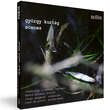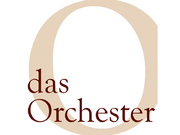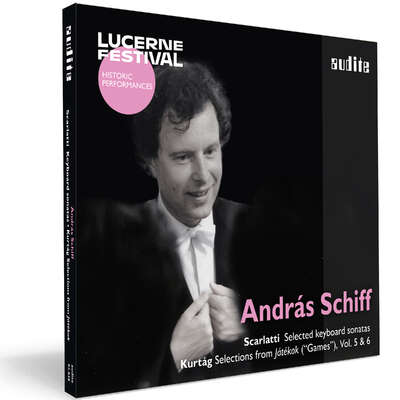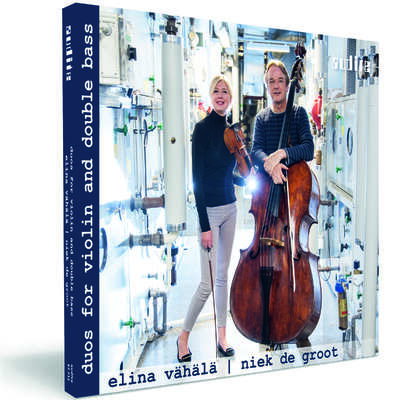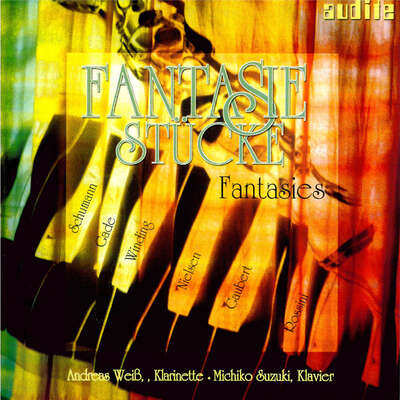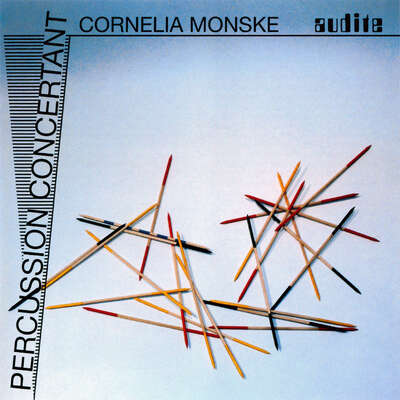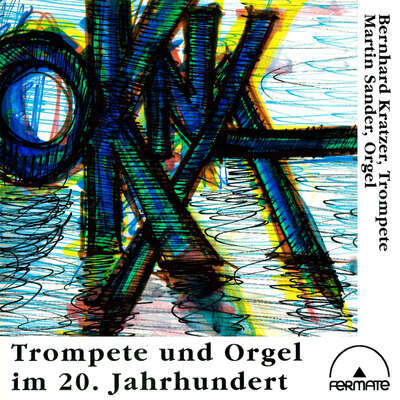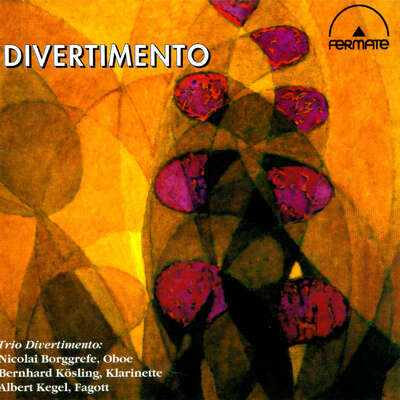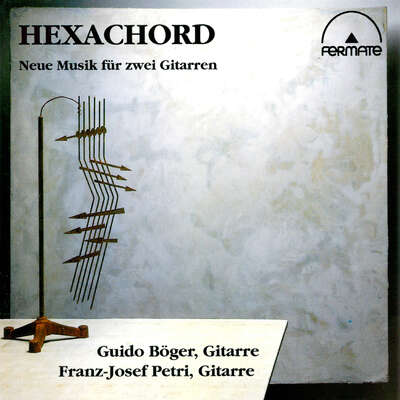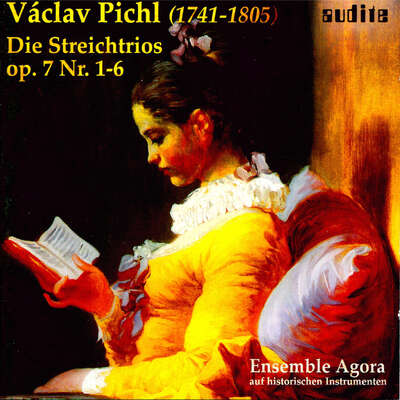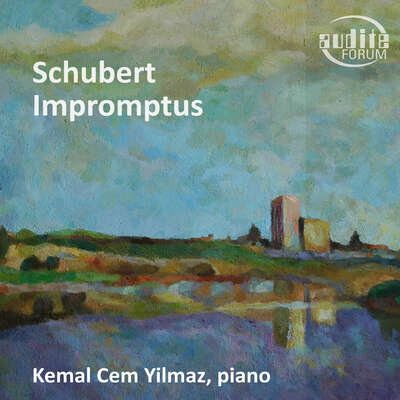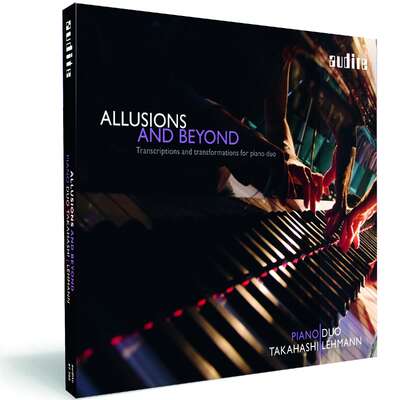
Indispensable Kurtág discoveries: the premiere recording of Kurtág's settings of the "Sudelbücher" closes a crucial gap in his discography. At the same time, additional new recordings provide a fresh approach to well-known chamber music by this master of miniature. The four outstanding soloists impress in the original scoring for soprano, violin, cimbalom and double bass.more
"Viktoriia Vitrenko is clearly a top-drawer soprano with a clear, pure voice under perfect control with crisp, clear diction and great expression." (The Art Music Lounge)
Details
| György Kurtág: Scenes | |
| article number: | 97.762 |
|---|---|
| EAN barcode: | 4022143977625 |
| price group: | BCA |
| release date: | 2. August 2019 |
| total time: | 60 min. |
Bonus Material
Informationen
György Kurtág, 93, ranks among the great living composers of classical modernism. Consistently shortening and accentuating his works, he perfected his aphoristic style, producing concise miniatures.
This new album is dedicated to previously unreleased works by Kurtág, presenting for the first time twenty-two movements after Georg Christoph Lichtenberg's Sudelbücher, scored for soprano and double bass: a real discovery of aphorisms. Also based on literary models are his Scenes from a Novel, Op. 19, after fifteen poems by Rimma Dalos (soprano, violin, cimbalom, double bass). The Seven Songs, Op. 22 (soprano, cimbalom) and In Memory of a Winter Evening, Op. 8 (soprano, violin, cimbalom), appear for the first time on CD.
This thoughtfully compiled collection shows the Hungarian master as one of the most individual artistic voices of our time.
The four internationally renowned soloists, here in the original and charming formation of soprano, violin, cimbalom and double bass, interpret some of the most densely wrought pieces by György Kurtág.
Reviews
Diapason | N° 701 JUIN 2021 | Gérard Condé | June 1, 2021
Six opus en soixante et une minutes, c’est la norme depuis le siècle dernier. Mais cinquantesept aphorismes suivis, chacun, de cinq secondes deMehr lesen
Seulement, souffler n’est pas jouer. En ne livrant que des points de départ, quoiqu’infiniment variés, Kurtag se dérobe à la gageure inhérente à la composition, la pierre de touche qui distingue les chefsd’œuvre : le saccage ordinaire de l’idée initiale ou son exploitation fructueuse. Cristallins et tranchants comme une coupe brisée, les Huit duos op. 4 pour violon et cymbalum doivent aux contrastes qui les opposent cette cohérence par complémentarité dont Schönberg et Webern ont laissé des modèles. Les Sieben Lieder op. 22 aussi, l’élan juvénile en moins. Tandis que les Einige Sätze aus den Sudelbüchern, vingt-deux lieder sur des aphorismes ironiques de Georg Christoph Lichtenberg (1742-1799) pour soprano et contrebasse se résument peu à peu à une succession de faire-valoir pour la cantatrice qui chante, chuinte, beugle ou file avec une impeccable maîtrise, et pour les prouesses de son partenaire dont la justesse d’intonation, la netteté de l’articulation frappent plus encore. Faire-valoir aussi pour le compositeur capable d’imaginer tant de combinaisons différentes, mais s’en tient là.
A la différence de l’impression profonde que laisse In Erinnerung an einen Winterabend op. 8 dont les quatre volets, associant violon, voix et cymbalum, s’imposent comme le cœur vibrant de ce programme. Pour la même formation, les Scènes d’un roman (sur quinze poèmes de Rimma Dalos), évoquent un elliptique Winterreise et frappent par leur intense expressivité. Elles ont prêté leur titre au disque mais leur place en première ligne peu déconcerter. Il faut les réécouter après avoir parcouru l’ensemble pour en saisir toute la portée.
Crescendo Magazine | Le 12 mai 2020 | Patrice Lieberman | May 12, 2020 | source: https://www.cres... La force brûlante du dépouillement
[...] clôt magnifiquement cet enregistrement dont tous les interprètes méritent les plus vives louanges, à commencer par la brillante et sensible soprano Viktoriia Vitrenko, dont la voix claire, la fine sensibilité et la technique assurée sont ici idéales. On louera tout autant les belles contributions du violoniste David Grimal, du sensible cymbalumiste Luigi Gaggero et de l’éblouissant contrebassiste Niek de Groot.Mehr lesen
http://operalounge.de
| 23.01.2020 | Gerhard Eckels | January 23, 2020 | source: http://operaloun...
Vokale Spannungen
Puccini, Wagner, Weill und Kurtag bei Sterling, SWR, audite und Ensemble Modern
Im vielfältigen Oeuvre des ungarisch-französischen Komponisten György Kurtág (*1926) ist auffällig, dass die menschliche Stimme eineMehr lesen
Fono Forum | Januar 2020 | Dirk Wieschollek | January 1, 2020
Kritiker-Umfrage 2019
Welche fünf CDs haben Sie im vergangenen Jahr am meisten beeindruckt?
Dirk Wieschollek: "Kurtág: Scenes; Viktoriia Vitrenko, David Grimal, Luigi Gaggero, Niek de Groot (audite). Kurtágs aphoristische Vokalzyklen inMehr lesen
Fono Forum | Dezember 2019 | Dirk Wieschollek | December 1, 2019
Dass György Kurtag ein Meister musikalischer Aphoristik ist, ist kein Geheimnis. Selten hat man diese hervorstechende Qualität seiner MusikMehr lesen
Einen großen Anteil an der Eindringlichkeit dieser Produktion hat die Sopranistin Viktoriia Vitrenko, die in den "Scenes from a Novel" op. 19 zwischen Lyrismus und Burleske mit großer Natürlichkeit agiert, ohne jede überzogene Dramatik und Expressivität – ein Glücksfall für diese 15 Lieder nach Gedichten von Rimma Dalos, die in der unkonventionellen Besetzung Sopran, Violine, Kontrabass und Zymbal farbintensiv und gestenreich musikalische Versatzstücke aus Volks- und Popularmusik integrieren. Das Zymbal ist eines der Lieblingsinstrumente des ungarischen Komponisten und heimlicher Protagonist dieser Einspielung: nicht nur in den Acht Duos für Violine & Zymbal op. 4, sondern insbesondere in den Sieben Liedern op. 22, wo die resonanzträchtigen Klänge Luigi Gaggeros entscheidenden Anteil haben an der (alp-)traumhaft versponnenen Atmosphäre einsamer Klangräume.
Die Ersteinspielung der "Sätze aus den Sudelbüchern Christoph Lichtenbergs" op. 37a verkörpert in Anlehnung an den Duktus von Lichtenbergs Geistesblitzen einen Extrempunkt musikalischer Aphoristik. Gemäß der Ironie der Vorlagen lässt es Vitrenko hier skurriler und melodramatischer angehen. 22 Kleinode kompositorischer Konzentration auf das Wesentliche.
Gramophone | December 2019 | Arnold Whittall | December 1, 2019
Coincidences like this are rare indeed at the high modernist end of the music spectrum. Two new CDs of Kurtág’s works for solo voice each beginMehr lesen
Both singers, Susan Narucki and Viktoriia Vitrenko, give persuasive performances, ensuring that the shrieks and swoops with which Kurtág underlines the extreme emotions involved do not get in the way of the soaring, immersive eloquence that is the music’s strongest suit. Maybe the Avie recording for Narucki is just that bit more spacious and smoothly balanced than the Audite version. But there are more obvious differences that may make it easier to choose one over the other. Audite expects you to download the crucial texts, rather than providing them in the booklet as Avie does, and Audite’s English versions of the German notes are not ideally idiomatic. Also in Avie’s favour is the rest of the programme, which offers the mesmerising monodies of the Attila József Fragments (1981) as the main complement to Scenes from a Novel. Audite opts for the 22 often tiny aphorisms setting German texts taken from the scrapbooks of Georg Christoph Lichtenberg (1999).
These were originally drafted as vocal monodies, Kurtág eventually adding the double bass accompaniments included here. Given the quirky character of Lichtenberg’s texts – sometimes teasingly abstract, sometimes gnomically whimsical – the role of the accompaniment is inevitably less expressively transparent than with the more atmospheric Dalos or József settings, and the overall effect is rather less rewarding. Yet even if the programmes as a whole are not sufficiently complementary to encourage an unqualified recommendation for buying both, Audite’s inclusion of two purely instrumental works, the early set of Duos for violin and cimbalom and the tiny Hommage à Berényi Ferenc, which ends the disc with Kurtág in unusually gentle, even nostalgic mood, are difficult to resist.
Classica – le meilleur de la musique classique & de la hi-fi | N°218 - Déc. 2019-Janv. 2020 | Jérémie Bigorie | December 1, 2019
La voix écorchée et intentionnellement non opératique de Viktoriia Vitrenko renforce ses qualités de conteuse annexant une vaste gamme de sentiments, du petit chaperon rouge apeuré au grand méchant loup affamé. Plus ironique, le cycle d'après des fragments de Lichtenberg explore toute la tessiture (aigus engorgés) de la contrebasse. Nos quatre musiciens allient concentration du geste et dosage dynamique millimétré au service d'un langage délibérément «impur».Mehr lesen
Das Orchester | 12/2019 | Mathias Nofze | December 1, 2019 | source: https://dasorche...
Die Sopranistin Viktoriia Vitrenko legt eine großartige Wandlungsfähigkeit an den Tag, mit der sie tatsächlich so etwas wie imaginäre Szenen erschafft. [...] Verlassen kann sie sich dabei auf kongeniale Mitspieler (David Grimal, Violine, Luigi Gaggero, Zymbal, und Niek de Groot, Kontrabass). [...] Die Klangqualität lässt nichts zu wünschen übrig: transparent, aber nicht trocken, und angemessen „herangezoomt“.Mehr lesen
Das Opernglas | November 2019 | JG | November 1, 2019
[...] kann man geradezu süchtig werden nach den ungemein ausgefeilten und tiefempfundenen Miniaturen. [...] Mehr lesen
Musica | N . 311 - NOVEMBRE 2019 | Gabriele Moroni | November 1, 2019
Gli strumentisti sono bravissimi e fra questi spicca l’italiano Luigi Gaggero al cimbalom, ma nell’insieme è il soprano Viktoriia Vitrenko la figura in primo piano: l’intonazione precisa e accurata (talora Kurtág ricorre ai microintervalli e sfrutta leggeri glissandi) e ` solo un prerequisito, un dato di partenza sul quale la Vitrenko costruisce un’interpretazione caratterizzata da una ricchezza di toni espressivi e da una capacità di recitazione veramente ammirevoli.Mehr lesen
www.musicweb-international.com | Thursday 17th October | Richard Hanlon | October 17, 2019 | source: http://www.music...
These two Kurtág discs were released more or less simultaneously. Both are song recitals; the unusual ensemble is common to both albums but a coupleMehr lesen
Kurtág is now 93; he is the king of the aphorism, and his music unquestionably demands the fullest concentration on the part of the listener. His is an art of compression and in the works spread across these two discs every second counts; every breath, sound and silence – every heartbeat. Reviewing them in tandem has been an education for me, comparable to the considerable time I spent thirty years ago getting to grips with Webern. Familiarity in this case breeds power and understanding. I started with the Op 22 cycle for voice and cimbalom. These ‘dialogues’ with oneself, their ‘calls and responses’ range from a tiny, exuberant declamation of self-frustration (No 2, Egyensúly) via a hypnotic, enigmatic repetition of a single line (No 5, Labirintus), to the fragile ethereal beauty of No 6 (Ami megmaradt) and the plodding riddle of No 7, Ars poetica – a haiku/fable which alludes to a snail ascending Mount Fuji. On the Audite disc the silken-voiced Ukrainian soprano Viktoriia Vitrenko finds life and drama in a reading which ravishes and delights, while she is accompanied by an apparently fruitier sounding cimbalom than is Susan Narucki on Avie. But with the American’s subtly shaded, more attentive focus on the sound and projection of the Hungarian language she perhaps conveys yet more breadth with the gentler instrument. Either way, both interpretations are treasurable.
In the four stanzas and six plus minutes of Kurtág’s relatively early Opus 8 Egy téli alkony emlékére (A Twilight in Winter Recollected) the intense melancholy of Pál Gulyás’ words are initially matched with a yearning, ultimately questioning violin line and a stumbling cimbalom, while the second stanza evokes a benignly Bergian expressionism, which is radiantly conveyed by Narucki. The last two verses are more jagged and astringent, qualities that certainly don’t daunt the American and which underpin the violin part until the closing phrase of the piece. The Audite recording is warmer than its Avie counterpart, and beautifully suits Vitrenko’s accomplished theatrics in both the quieter music and its more violent outbursts. The instrumentalists on this disc also seem to allow Kurtág’s condensed ideas a little more space. But it’s not a competition, and the differences between these readings both illuminate and validate this extraordinary music.
Both discs open with one of Kurtág’s best-known vocal works, the fifteen brief ‘songs’ of Scenes from a Novel, Op 19 to words by the Russian poetess Rimma Dalos. A double-bass is added to the mix here. Listening to these performances in close succession, the idea of Kurtág, the master of the miniature writing a full-length opera (his Fin de Partie was premiered last year to more or less unanimous acclaim) seems less improbable. Scenes from a Novel essentially incorporates the monologue of a woman who has loved and lost, but is ultimately (outwardly at least) feisty and resilient to the experience. At its centre is the histrionic seventh song, Rondo; the musical and emotional ground covered in this three minute number (an epic by Kurtág’s standards) is extraordinary. I really enjoyed both these accounts of this masterpiece. First of all, the wealth of drama and colour the composer conjures in an instrumental accompaniment of just three instruments is astonishing in itself, and if the Avie disc revels in the meticulous musicality of the detail, the Audite performers are cushioned by terrific sonics which expertly amplify Viktoriia Vitrenko’s raw and neurotic take on these songs. On the other hand, Susan Narucki’s more refined, micro-analytical approach serves this simultaneously complex and simple music equally convincingly. One might expect the Ukranian singer perhaps to sing Russian more idiomatically but to my ears there is nothing to choose between them. In terms of this shared repertoire then, I strongly suspect ardent Kurtágophiles will want both discs.
The remaining pieces on both discs support this view. Susan Narucki provides abundantly musical accounts of Kurtág sets that have in the main been recorded before. Notable among these is his Op 20, the peculiar cycle of unaccompanied vocal fragments set to the words of Attila József. These tiny statements (they defy the appellation ‘poetry’) are pregnant with depth and universality, while Narucki invests these naked, improbably powerful pieces (and the brief silences that separate them) with profound tact and riveting musicality. One work that was completely new to me was the set of Inscriptions Op 25, with piano accompaniment. The first of these, Flower is a setting of a fifteenth century text which is at once almost childlike; it’s delivered by Narucki as if she is projecting a rainbow of sadness. The third and final inscription incorporates words found on the grave of a young woman consumed by fever on the eve of the Second World War. It is devastating, its piano accompaniment quietly Ligetian. Narucki’s instrumental collaborators are beyond superb, and the Avie sound remains consistently cool and detailed, abundantly suitable for Kurtág’s elaborate creations.
An added attraction of the Audite issue is what appears to be the premiere recording of Kurtág’s Op 37a, Several Movements from Georg Cristoph Lichtenberg’s Scrapbooks. These are settings for voice and double-bass and once again draw out Viktoriia Vitrenko’s latent theatricality as well as featuring a remarkable double-bass part brilliantly played by Niek de Groot. Listeners will not need a translation to be impressed by the dark humour of these miniatures. This is Kurtág in an uncharacteristically ironic vein.
The disc also features a couple of Kurtág’s purely instrumental works which provide some welcome respite from his vocal output. The early Duos Op 4 for violin and cimbalom alternate flavours of goulash spice and tartness, while in the solo cimbalom Hommage to the painter Ferenc Berényi (a 70th birthday present) he communicates a heartfelt, yet seemingly effortless profundity. Audite’s sound is bathed throughout with a cushioned warmth which perhaps surprisingly works wonders with Kurtág’s sometimes barbed, astringent music.
In conclusion, while elements of this review are necessarily comparative, I certainly don’t wish to imply that I prefer one or other of these fine discs. The repertoire is incontrovertibly fascinating, and the performances and recording in each case are first rate. Adherents of Kurtág’s powerful, unique, humane voice will need no persuasion from me to acquire both. Newcomers can rest assured that either issue will provide immense satisfaction. Hopefully it will not be too long before we have the premiere recording of Fin de Partie.
hifi & records | 4/2019 | Hans-Dieter Grünefeld | October 1, 2019
Über die Musik des ungarischen Zeitgenossen György Kurtag wird oftMehr lesen
De Standaard | woensdag 4 september 2019 | avb | September 4, 2019
Het werk vormde een gat in Kurtágs discografie, maar deze cd brengt daar verandering in. Niek de Groot, met zijn pittige contrabaspatsen, en Viktoriia Vitrenko zijn overtuigende vertolkers.Mehr lesen
www.pizzicato.lu | 03/09/2019 | Uwe Krusch | September 3, 2019 | source: https://www.pizz... György Kurtag: Kaum hörbare Kleinigkeiten in Vollendung
Neben neuen Deutungen bereits eingespielter Werke werden auf dieser CD erstmals 22 Vertonungen der Sudelbücher von Lichtenberg vorgelegt. Kurtag istMehr lesen
Die vier Interpreten dieser Aufnahme haben sich die besondere Transzendenz dieser Musik in Fleisch und Blut übergehen lassen und horchen jeden Ton aus, bevor sie weiter gehen. Trotz der Kürze der Werke, die an die zugespitzte Prägnanz japanischer Haikus erinnert, entwickeln sie den richtigen leisen Atem für diese Kompositionen.
Die ukrainische Sopranistin Viktoriia Vitrenko beherrscht vom gesäuselten bis zum eruptiven Ton die gesamte für diese Werke nötige Breite an Ausdrucksvariabilitäten. David Grimal ist bekannt für sein feinsinnig spontan wirkendes und zugleich zupackendes akzentreiches Spiel, dass er nicht nur in den Duos mit Zymbal, sondern eben auch in den Szenen eines Romans die Bebilderung der Szenerie pastellfarben koloriert. Das Zymbal hat als Instrument inzwischen auch über die ungarischen Staatsgrenzen hinaus Verbreitung gefunden, so bis zu Luigi Gaggero. Und das betrifft nicht nur das Instrument, sondern auch die Spielweise, wie er speziell in der Hommage an den ungarischen Maler Franz Berényi zeigen kann. Der Kontrabassist Niek de Groot ist momentan einer der herausragenden Spieler seines Instruments und steuert dementsprechend eine elegant leichtfüßige Basslinie bei.
In addition to new interpretations of already recorded works, this CD offers 22 movements from Georg Christoph Lichtenberg’s ‘Scrapbooks’ (‘Sudelbücher’), Op. 37a. The four performers of this recording have let the special transcendence of this music pass into flesh and blood and listen to every note before continuing. Despite the brevity of the works, which is reminiscent of the pointed conciseness of Japanese haikus, they have the right soft breath for these compositions.
www.opusklassiek.nl | september 2019 | Siebe Riedstra | September 1, 2019 | source: https://www.opus...
Vitrenko heeft voor haar partner op de contrabas een gouden greep gedaan: niemand minder dan Niek de Groot, voormalig solobassist van het Concertgebouworkest ontfermt zich over deze hondsmoeilijke partij, en hoe! Alleen al om dit werk is de cd meer dan de moeite waard, maar dat is nog maar het begin. Vitrenko heeft niet alleen een prachtige stem, een formidabele tecnniek, ze is ook een begenadigde zingende actrice. <br /> De overige instrumentalisten, violist David Grimal en cimbalomspeler Luigi Gaggero, zijn van hetzelfde uitzonderlijke kaliber en zorgen voor een meesterlijke uitvoering van de acht Duo's opus 4.Mehr lesen
De overige instrumentalisten, violist David Grimal en cimbalomspeler Luigi Gaggero, zijn van hetzelfde uitzonderlijke kaliber en zorgen voor een meesterlijke uitvoering van de acht Duo's opus 4.
Rondo | 17.08.2019 | Guido Fischer | August 17, 2019 | source: https://www.rond...
Dieses Porträt des Lied- und Kammermusikkomponisten Kurtág bewegt.Mehr lesen
Musik an sich | Georg Henkel | August 10, 2019 ESSENTIELL UND EXISTENZIELL
György Kurtag, der Meister der musikalischen Miniatur, benötigt oft nur wenige Takte, ja eine Hand voll Noten, um Welten von größterMehr lesen
Auf der aktuellen CD Scenes finden gleich fünf kammermusikalische Zyklen und ein Einzelwerk Platz: Zusammen ergibt das 57 Tracks bei rund 61 Minuten Spielzeit. Die kürzesten Stücke währen nicht einmal 20 Sekunden, das längste drei Minuten. In alle Fällen frappiert die Kunst, den Kondensaten die Kraft von miniaturisierten Epen zu verleihen.
Das Expressive, Theaterhafte der hier versammelten Stücke lässt leicht verstehen, warum man von Kurtag trotz seiner verknappten Schreibweise immer eine abendfüllende Oper erhofft hat, die er erst im fortgeschrittendsten Alter von über 90 Jahren vorgelegt hat: "Fin de partie", eine wortgetreue Vertonung des gleichnamigen Theaterstücks von Samuel Beckett, wurde 2019 in einer ersten, noch nicht vollendeten Fassung, an der Mailänder Scala uraufgeführt.
Die Kunst Kurtags, mit den Worten der dichterischen Vorlage in eine dialogische Beziehung zu treten und ihre Ausdrucksenergien auf kleinstem Raum zu entfalten, kann man auch auf der vorliegenden Aufnahme bei den Gesängen zu Gedichten von Rimma Dalos "Szenen aus einem Roman" op. 19, den "Sieben Liedern" op. 22, dem Zyklus "In Erinnerung an einen Winterabend" op. 8 und "Einige Sätze aus den Sudelbüchern Georg Christoph Lichtenbergs" op. 37a entdecken. Die Stücke sind für Sopranstimme, Violine, Kontrabass und/oder Zymbal (Hackbrett), geschrieben. Letzteres hat auch in rein instrumentalen Besetzungen Kurtags Interesse gefunden. Und so ergänzen die "Acht Duos für Violine & Zymbal" op. 4 sowie das finale "Homage à Berényi Ferenc" op. 70 für Solo-Zymbal das Programm.
Trotz der unterschiedlichen Inspirationen ist ein Album von starkem innerem Zusammenhalt entstanden: Kurtags aus vielen Traditionen sich nährende Sprache ist bei aller Vielfalt unverwechselbar; eine gleichsam "ungarische" Mundart äußert sich nicht nur in den Vokalwerken auf muttersprachliche Dichtung, sondern in der instrumentalen Besetzung. Dieser gewinnt der Komponist immer wieder die wunderbarsten Klangfarben und Schattierungen ab, wobei die beschließende "Hommage" mit dem archaisch tönenden Zymbal einen geradezu transzendenter Ausklang bildet.
Luigi Gaggero, der auch den vorzüglichen Booklettext beigesteuert hat (zu den vertonten Texte führt ein QR-Code, sie gibt es nur auf der Homepage des Lables Audite). Gaggero verweist auf den authentischen spirituellen Kern von Kurtags Musik - im italienischen Original ist sogar von "Musica sacra" die Rede. Das ist nicht im religiösen Sinne gemeint; Kurtag vertont keine liturgischen Texte, äußert keine religiösen Bekenntnisse.
Und doch stimmt, was Gaggero schreibt: im Innersten dieser Musik ist Licht; ein Licht, dass der Komponist, unvollkommen, ungenügend und schuldbewusst, sucht "wie eine Motte das Licht" (um es in Kurtags eigenen Worten zu sagen). Die zweieinhalb Minuten, die die "Hommage" dauert, erscheinen wie das zarteste, tastende Suchen, um eine Ahnung jenes innersten Lichtes einzufangen. Die Zymbal-Klänge sezten zörgende Spuren, leuchten in der Dunkelheit der Stille. Das ruhige Werk ist ein Höhepunkt dieser Platte, wobei die Produzenten darauf geachtet haben, dass die abschließende Schlussstille den nötigen Raum bekommt, um als solche wirklich erfahrbar zu werden und nicht durch das Motorengeräusch des Lasers ausradiert zu werden.
Bemerkenswert sind nicht nur die poetischen Duos für Hackbrett und Violine, sondern auch die Lieder für Sopran und Instrumente. Mit der Sopranistin Viktoriia Vitrenko wurde eine Solistin gewonnen, die ein tiefes Verständnis und die nötigen technischen Fähigkeiten für Kurtags differenziert dramatische Sing-Sprech-Artikulationen hat, bei denen oft von einem zum anderen Ton eine ganz neue Klangwelt sich auftut und die Sängerin wie ein Seismograph feinste seelische Regungen nachzeichnen muss.
Egal, ob lyrische Linien im schönsten, vibratoarmen Ton zu singen oder Worte entsagungsvoll zu flüstern sind oder harsche, grelle Lautungen in extremer Dynamik geäußert werden müssen: Mühelos bewältigt Vitrenko den Wechsel der Klang- und Ausdrucksregister. Ihre Stimme schmiegt sich in die Musik, so dass sie selbst in extremen Zuspitzungen ganz natürlich wirkt und nicht outriert. Es sei denn, die Musik Kurtags fordert eben dies; freilich ist diese selbst in ihren brennendsten Schmerz- und Sehnsuchtsmomenten immer existentiell, wahrhaft, lauter - selten einmal gewollt komisch, gar ironisch (wie in den witzigen Lichtenberg-Aperçus).
Mit David Grimal an der Violine und Niek de Groot am Kontrabass stehen der Sängerin ebenbürtige Instrumentalisten zur Seite; in Kurtags musikalischen Universen gibt es keine "Begleitung", hier sind alle Beteiligten gleichermaßen an der Darstellung beteiligt. So müssen auch die Streicher und das Zymbal eine Fülle unterschiedlichster Klangäußerungen vom satt gestrichenen Einzelton bis hin zum geisterhaften Flageolett-Glissando meistern.
Der Komponist ist für seine sehr kritische Haltung und seine unerbittliche Probenarbeit bekannt. Oft erarbeitet er seine Werke in strapaziösen Proben, bei denen sich jeder Ton "verdient" werden muss. Legendär ist beispielsweise ein Kommentar wie: "Sie singen das so, wie es geschrieben ist. Das ist falsch." Zwar fehlt bei dieser Produktion ein Hinweis auf die Mitwirkung des Komponisten, doch angesichts der Detailgenauigkeit und Intensität darf man davon ausgehen, dass die Interpreten ganz im Geiste des strengen Meisters musizieren.
Auch klangtechnisch famos gelungen, ist dieses Album ein weiterer Meilenstein in der Kurtag-Diskographie.
The Guardian | Thu 8 Aug 2019 | Andrew Clements | August 8, 2019 | source: https://www.theg... The Edge of Silence: Works for Voice by György Kurtág review – vivid, profound and totally compelling
A performance of Scenes from a Novel, with Viktoriia Vitrenko as the soprano, is also the first work on Scenes, a Kurtág collection from Audite. The Seven Songs and In Memory of a Winter Evening are also common to both discs, but Vitrenko’s contributions also include the first ever recording of Several Movements from Georg Christoph Lichtenberg’s Scrapbooks Op 37a-22, settings of aphorisms by the 18th-century satirist, in which the soprano is supported by just a solo double bass. Vitrenko is a cooler, less expressively generous interpreter than Narucki, but her disc is invaluable nevertheless; it fills in another small gap in our knowledge of one of the greatest composers of our time.Mehr lesen
www.qobuz.com | 02.08.2019 | François Hudry | August 2, 2019 | source: https://www.qobu...
Des enluminures poétiques des Stsenï iz romana (« Scènes de roman sur des poèmes de Rimma Dalos ») chantées en langue russe à l’Hommage à son ami peintre Berényi Ferenc, cet enregistrement idéalement interprété rend compte de l’itinéraire d’un compositeur particulièrement secret et captivant.Mehr lesen
www.qobuz.com | 02.08.2019 | François Hudry | August 2, 2019 | source: https://www.qobu...
From the poetic highlights of Stsenï iz romana ("Scenes from a novel on poems by Rimma Dalos") sung in Russian, to the Homage to his friend, the painter Berényi Ferenc, this perfectly-performed recording follows the trail of a particularly secret and captivating composer.Mehr lesen
www.qobuz.com | 02.08.2019 | François Hudry | August 2, 2019 | source: https://www.qobu...
Von den poetischen Miniaturen der Stsenï iz romana ("Szenen aus einem Roman auf Gedichte von Rimma Dalos") in russischer Sprache bis hin zur Hommage an seinen Freund, den Maler Berényi Ferenc spiegelt diese perfekt interpretierte Aufnahme den Werdegang eines besonders geheimnisvollen und faszinierenden Komponisten wider.Mehr lesen
The Art Music Lounge | JULY 25, 2019 | Lynn René Bayley | July 25, 2019 | source: https://artmusic... György Kurtág Creates Scenes
Viktoriia Vitrenko is clearly a top-drawer soprano with a clear, pure voice under perfect control with crisp, clear diction and great expression.Mehr lesen
